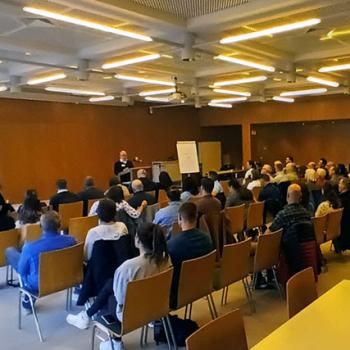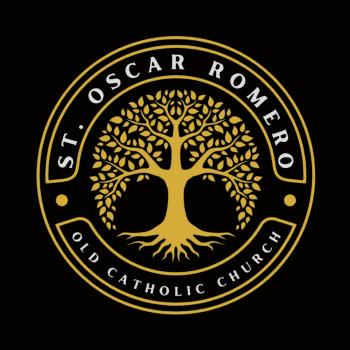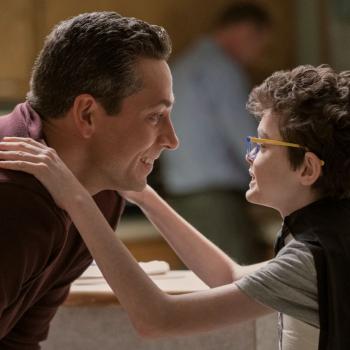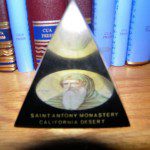Shameful admission: I didn't know about The Wild Hunt until it linked to one of my essays. But I'm glad that I discovered it (through it discovering me—look, it's complicated), mainly because there are a lot of important stories that I know I would never have seen if it weren't for Jason Pitzl-Waters's diligence. He ran one of those stories recently, regarding the Buncombe County School's distribution of Bibles (and their completely unsurprising change of heart when free books on pagan religions were offered for similar distribution by Byron Ballard and Ginger Strivelli).
Issues of religion and public education have been interests of mine for a long time. And I can certainly relate to the position Ms. Strivelli's son found himself in: I was a product of the St. Louis Public Schools District myself, and it was in that school system that I learned how to play the religious identity game. In my personal life, I knew the boundaries pretty well: I knew to keep my mouth shut about Full Moon when we were around my aunt or my grandpa, for example. (I still do, for what it's worth.) But school, as my first introduction to life in a "public sphere," was much more complicated than that.
Looking back, it's remarkable just how little anyone thought about keeping a distance between religion and school while I was attending Shepard Elementary in the early '90s. I sang in the school choir's holiday program, which featured mainly explicitly Christian carols: "Away in a Manger," "Silent Night," "Little Drummer Boy," and so on. I even had a solo in the spiritual "What You Gonna Call Your Pretty Little Baby." (I was the one who sang, "Some say one thing / I'll say Immanuel.") I recall a few of my teachers invoking Jesus by name during class, too. I even recall an argument with another kid on the playground in which he asserted that non-Christians didn't exist (except, I think, for Catholics, whom he said didn't count). Thankfully nobody ever tried to make me pray; although, as I've discussed in other columns, at that age I probably wouldn't have objected, since I didn't quite understand that I was a pagan at that point.
That said, I also remember performing a skit about the Greek Gods during that time. I played Zeus (of course!) and got my friends to play the other gods. (The only thing I remember about the content of the skit was that Ares was the bad guy and that I was the only one with a real costume—a bed sheet toga and a fake gray beard. To the kid's credit who played Ares, he did manage to find a helmet—a black motorcycle helmet.) Nobody complained about it. Probably they just thought it was fiction. Whether they suspected those gods had any more meaning to me, I couldn't say, but it's interesting to look back and realize that, on occasion, I hid clues to my inner life in plain view.
In middle school, I was able to be a little more overt. Partly this was because of my own development—I just understood what it meant to be a pagan more, and recognized that I was one—and partly because, well, I was a pretty dull kid. The discipline-minded teachers were too busy breaking up fights or trying to catch kids smoking to even realize that I was rather quietly slipping references to sabbats and gods into my schoolwork. And, thankfully, I ended up in an extremely progressive high school where my religion was not an issue. There were much stranger folk than I walking those halls.
But one of the things you learn as a pagan child is that, no matter how inviting the environment, there are always game rules, always limits to the kinds of expression you can get away with. I never wore a pentagram or a Thor's Hammer to school, for example, although I believe I got my first piece of pagan jewelry when I was eight or nine years old. It's possible that I could have worn one—I knew other kids who did—but they also all faced at least a little hassle over their jewelry. It marked them as students who had to be watched a little more closely, who would be less easily given the benefit of the doubt when it came to discipline. I avoided that by not wearing mine—at least not until high school, where it didn't matter so much. But that is the sort of decision a kid with a silver cross would never have to make.
We never had anyone set Bibles down in our office, much less have a special "break time" devoted to passing out those Bibles. But I do remember once being given a small green Bible, about the size of a Moleskine notebook, by a man standing outside my high school. I think he came there once a year to distribute the tiny Bibles, whose pages were printed on paper so thin that just turning them too fast could tear them out of the binding. Nobody ever said anything to this man that I'm aware of; nobody asked him not to peddle his wares to the students, or to quit loitering on school property. Even I accepted his Bible with a smile and thought nothing more of it—just another memento from another Christian pusher. Throw it on the pile.
I applaud Rev. Ballard and Ms. Strivelli's resistance against the Buncombe School's passive endorsement of one religion over another. These sorts of cases always seem to end in the authorities sheepishly shrinking away from their original defense of the majority religion when confronted with requests for equal representation from the minority. But I also applaud them for reminding me of some of the unspoken truths of my own pagan childhood: namely, that the real power of the majority is for their views to be so pervasive as to become invisible, for those of us in the minority to not even realize when we're being wronged.
1/9/2012 5:00:00 AM





